This website uses cookies so that we can provide you with the best user experience possible. Cookie information is stored in your browser and performs functions such as recognising you when you return to our website and helping our team to understand which sections of the website you find most interesting and useful.
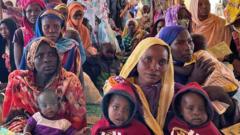
BBC News, Adré
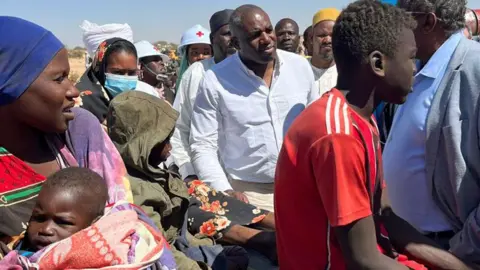 BBC
BBCEvery day families stream over a dry and dusty path into Chad, fleeing war and famine in Sudan - scenes that have clearly shaken the UK's foreign secretary.
Under the sweltering sun, David Lammy visited the Adré border post on Friday to witness first-hand the impact of Sudan's civil war which erupted when the army and its former ally, the paramilitary Rapid Support Forces (RSF), fell out.
Those who make it over the border have often been separated from their families in the chaos to escape and are desperate to see if their relatives have made it over safely.
"It's some of the most horrific things I've ever heard and seen in my life," said Lammy.
"Overwhelmingly, what I've seen here in Chad, on the border with Sudan, are women and children fleeing for their lives - telling stories of widespread slaughter, mutilation, burning, sexual violence against them, their children. And amongst it all, famine, hunger - such unbelievable plight."
The foreign minister saw the dozens of women wrapped in light, multicoloured shawls and holding children of different ages crossing over on horse-drawn carts.
They looked weary sitting on bags holding the few belongings they could bring with them in the long journey to safety.
"Alhamdulillah" meaning "praise be God", remarks Halima Abdalla when I asked her how she felt to have made it over the border.
The 28-year-old is relieved despite the tragedy she has suffered losing one of her children as she fled from Darfur, Sudan's western region, which has suffered some of the most devastating violence over the last 21 months - much of it alleged to have been perpetrated by the RSF.
"I first went to el-Geneina, but I had to run again when fighting broke out there," she says, explaining how she then became separated from her husband and two other children.
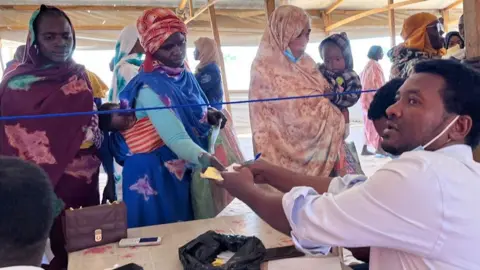
Aid workers in Adré say they have been trying to reunite families once they crossed the border.
"Some mothers have told us they had to choose which children to run with as they couldn't carry all of them at one go," an aid worker told the BBC.
Some abandoned children have been brought by humanitarian workers across the border and are put in foster care while efforts are made to find their families.
Standing on the Chadian side of the border, Lammy spoke to families that were fleeing and aid workers who were receiving them.
After meeting some of the refugees, he told the BBC: "All of these people have stories - very, very desperate stories of fleeing violence, of murder in their families, of rape, of torture, of mutilation."
"I just sat with one woman who showed me burn marks. She had been burned by soldiers up and down her arms, she had been beaten and she had been raped. This is desperate, and we must bring the world's attention to it and bring the suffering to an end."
But he decried what he described as a "hierarchy of conflict" that has seemingly placed Sudan's at the bottom, even though it is currently the world's largest humanitarian crisis.
In November last year, the UK foreign secretary spearheaded a resolution calling for a ceasefire at the UN Security Council, which Russia vetoed.
"How could you veto the plight that is going on here?" he asked, sounding exasperated.
He told the BBC he now planned to convene, in London, a meeting of Sudan's neighbours like Chad and Egypt and other "international partners to broker the peace".
Several attempts at peace talks led by the US and Saudi Arabia have failed to yield a solution to the conflict.
Since the mediation stalled, the US subsequently sanctioned the generals leading both sides of the war. It also determined that the RSF and its allies had committed genocide.
More than 12 million people have fled their homes since fighting broke out in April 2023.
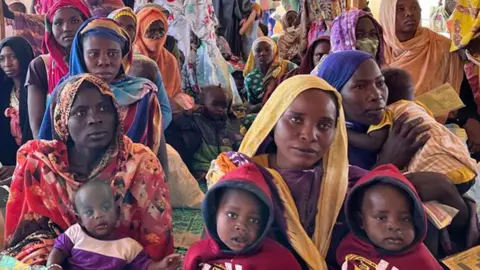
Caught in the middle of the bitter fighting are more than 50 million civilians, almost half of whom desperately need humanitarian aid, according to UN agencies.
Malnutrition rates are among the world's highest here. At the tented clinic in Adré, health workers measure the circumference of the upper arm of six-month-old Rasma Ibrahim.
The colour-coded tape goes all the way to the red end. The impact of her health status could last her entire lifetime. One in every seven children here in Adré is malnourished.
The UK would continue to push for a ceasefire, said Lammy.
It has already doubled aid to £200m ($250m), and is calling for other donor countries to step up.
Aid agencies are however concerned by the announcement by newly inaugurated US President Donald Trump of a 90-day freeze on foreign aid.
A disruption in the support of one of the world's largest donors will no doubt have devastating consequences on crises like Sudan. The UN is already struggling to meet its targets for badly needed aid money.
In 2024, an appeal for $2.7bn (£2.2bn) to support Sudan was put out, but only 57% of this money was provided.
At the food distribution centre in Adré, sacks of split yellow peas, millet, sorghum, and boxes of cooking oil and other supplies have been arranged neatly on top of tarpaulins as families from the nearby refugee camp queue for their quotas.
The cries of infants tied by shawls to their queueing mothers' backs fill the air. One-by-one, the families are called to collect their rations.
A man helps lift a sack of dry food on to the shoulder of another, who then hums as he makes his way back to his makeshift home.
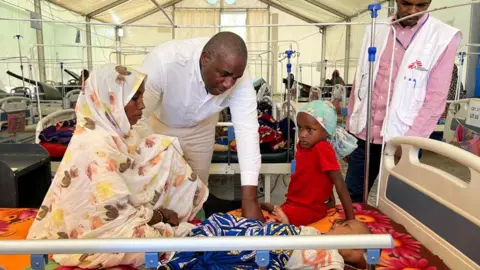
The population of Adré was about 40,000 before Sudan's civil war began and now it has grown more than five-fold, according to local volunteers.
The refugees here are among the lucky few. Just across the border, in Darfur, famine was declared in August in Zamzam camp, near the city of el-Fasher, which the RSF has besieged for more than a year.
On Friday came the devastating news that one of el-Fasher's last functioning hospitals was hit by a drone, killing at least 30 people. Regional authorities said RSF paramilitaries were the culprits, but they have not responded to the claim.
Back in December, the UN-backed Famine Review Committee said famine had spread to more areas - in Darfur to Abu Shouk and al-Salam camps and to parts of South Kordofan state.
The famine spread despite the re-opening of the Adré border that had been shut by the army on suspicion it was being used to transport weapons to its rivals.
As we left the border, three or four lorries with UN World Food Programme banners slowly rumbled down the dusty road crossing into Sudan.
They will be delivering much-needed aid to villages, towns and displacement camps beyond the border. But it is still far from sufficient.
"We have to step up and wake up now to this huge, huge crisis," said Lammy.
More about the war in Sudan:
 Getty Images/BBC
Getty Images/BBC


 Africana55 Radio
Africana55 Radio 

